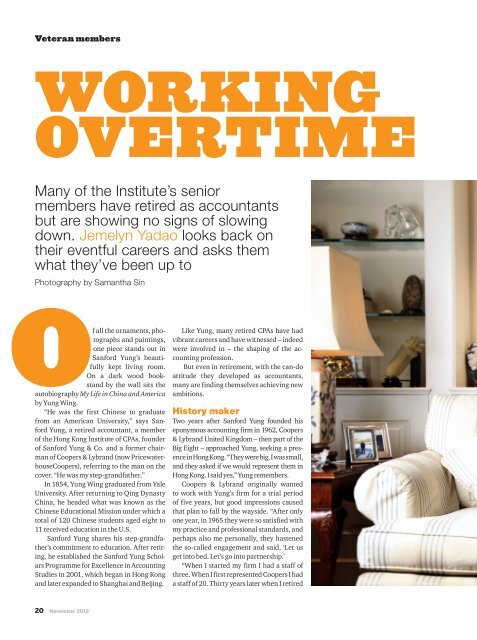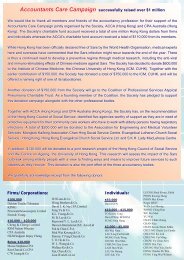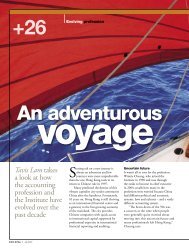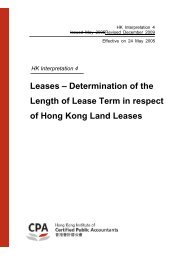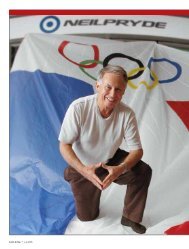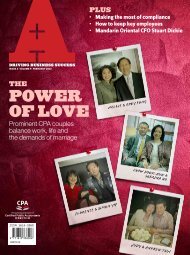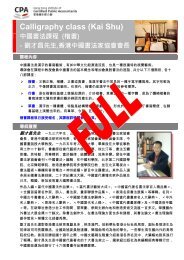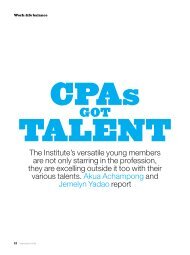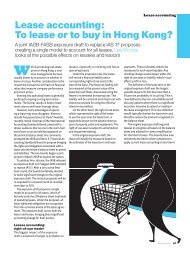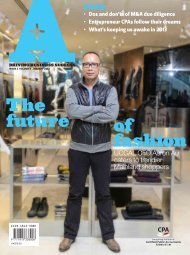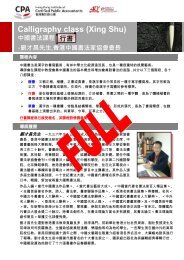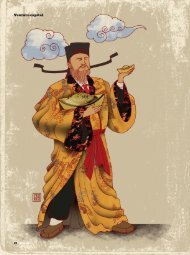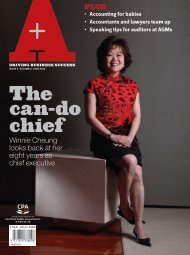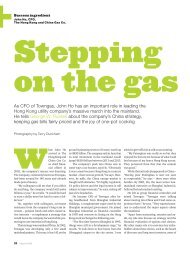Second wind - Hong Kong Institute of Certified Public Accountants
Second wind - Hong Kong Institute of Certified Public Accountants
Second wind - Hong Kong Institute of Certified Public Accountants
Create successful ePaper yourself
Turn your PDF publications into a flip-book with our unique Google optimized e-Paper software.
Veteran members<br />
WORKING<br />
OVERTIME<br />
Many <strong>of</strong> the <strong>Institute</strong>’s senior<br />
members have retired as accountants<br />
but are showing no signs <strong>of</strong> slowing<br />
down. Jemelyn Yadao looks back on<br />
their eventful careers and asks them<br />
what they’ve been up to<br />
Photography by Samantha Sin<br />
f all the ornaments, photographs<br />
and paintings,<br />
one piece stands out in<br />
Sanford Yung’s beautifully<br />
kept living room.<br />
On a dark wood bookstand<br />
by the wall sits the<br />
autobiography My Life in China and America<br />
by Yung Wing.<br />
“He was the first Chinese to graduate<br />
from an American University,” says Sanford<br />
Yung, a retired accountant, a member<br />
<strong>of</strong> the <strong>Hong</strong> <strong>Kong</strong> <strong>Institute</strong> <strong>of</strong> CPAs, founder<br />
<strong>of</strong> Sanford Yung & Co. and a former chairman<br />
<strong>of</strong> Coopers & Lybrand (now PricewaterhouseCoopers),<br />
referring to the man on the<br />
cover. “He was my step-grandfather.”<br />
In 1854, Yung Wing graduated from Yale<br />
University. After returning to Qing Dynasty<br />
China, he headed what was known as the<br />
Chinese Educational Mission under which a<br />
total <strong>of</strong> 120 Chinese students aged eight to<br />
11 received education in the U.S.<br />
Sanford Yung shares his step-grandfather’s<br />
commitment to education. After retiring,<br />
he established the Sanford Yung Scholars<br />
Programme for Excellence in Accounting<br />
Studies in 2001, which began in <strong>Hong</strong> <strong>Kong</strong><br />
and later expanded to Shanghai and Beijing.<br />
20 November 2012<br />
Like Yung, many retired CPAs have had<br />
vibrant careers and have witnessed – indeed<br />
were involved in – the shaping <strong>of</strong> the accounting<br />
pr<strong>of</strong>ession.<br />
But even in retirement, with the can-do<br />
attitude they developed as accountants,<br />
many are finding themselves achieving new<br />
ambitions.<br />
History maker<br />
Two years after Sanford Yung founded his<br />
eponymous accounting firm in 1962, Coopers<br />
& Lybrand United Kingdom – then part <strong>of</strong> the<br />
Big Eight – approached Yung, seeking a presence<br />
in <strong>Hong</strong> <strong>Kong</strong>. “They were big, I was small,<br />
and they asked if we would represent them in<br />
<strong>Hong</strong> <strong>Kong</strong>. I said yes,” Yung remembers.<br />
Coopers & Lybrand originally wanted<br />
to work with Yung’s firm for a trial period<br />
<strong>of</strong> five years, but good impressions caused<br />
that plan to fall by the wayside. “After only<br />
one year, in 1965 they were so satisfied with<br />
my practice and pr<strong>of</strong>essional standards, and<br />
perhaps also me personally, they hastened<br />
the so-called engagement and said, ‘Let us<br />
get into bed. Let’s go into partnership.’<br />
“When I started my firm I had a staff <strong>of</strong><br />
three. When I first represented Coopers I had<br />
a staff <strong>of</strong> 20. Thirty years later when I retired
“I said, ‘I’m the only partner and<br />
you allow my staff below me, an<br />
Englishman, to look at the minute<br />
books and not me? I don’t want the<br />
job.’ So I thanked him and left.”<br />
Sanford Yung<br />
November 2012 21
Veteran members<br />
from practice I had a staff <strong>of</strong> 750. So the expansion<br />
was quite rapid and quite gratifying,”<br />
recalls Yung, who became chairman <strong>of</strong><br />
Coopers & Lybrand <strong>Hong</strong> <strong>Kong</strong> in 1965.<br />
Of course, the rapid growth <strong>of</strong> the firm<br />
meant Yung had to deal with many challenges.<br />
He recalls one in particular involving the<br />
1959 purchase <strong>of</strong> Mercantile Bank by the<br />
<strong>Hong</strong>kong and Shanghai Banking Corporation.<br />
In 1965, Mercantile moved its head<br />
<strong>of</strong>fice from the U.K. to <strong>Hong</strong> <strong>Kong</strong> and was<br />
jointly audited by Peat Marwick Mitchell<br />
(now known as KPMG) and Coopers & Lybrand.<br />
An invitation to meet with a man<br />
named Freddie Knightly from Mercantile<br />
Bank in <strong>Hong</strong> <strong>Kong</strong> led to Yung sitting in an<br />
uncomfortable meeting.<br />
Knightly reminded Yung that Mercantile<br />
was now a subsidiary <strong>of</strong> <strong>Hong</strong>kong and<br />
Shanghai Banking Corporation, alluding to<br />
the parent bank’s policy <strong>of</strong> allowing only expatriates<br />
into the secrets <strong>of</strong> its financial records.<br />
“I said, ‘I’m the only partner and you<br />
allow my staff below me, an Englishman, to<br />
look at the minute books and not me? I don’t<br />
want the job.’ So I thanked him and left.”<br />
Half an hour after Yung got back to his<br />
<strong>of</strong>fice, he received a call from Knightly.<br />
“Knightly said: ‘You win. You can certainly<br />
look at our private books.’<br />
“I accepted it on those terms and became<br />
the first Chinese in the then 75-year history<br />
<strong>of</strong> Mercantile Bank to sign their secrecy<br />
book – a book directors and auditors must<br />
sign vouching that you would not divulge<br />
anything you see,” says Yung. “I stood up for<br />
the Chinese in my pr<strong>of</strong>ession <strong>of</strong> which I am<br />
extremely proud. I made it a point to raise<br />
the standard <strong>of</strong> my pr<strong>of</strong>ession.”<br />
Although the Sanford Yung Scholars Programme<br />
is now fully sponsored by PwC, his<br />
interest in the charity’s work remains strong.<br />
“The main purpose <strong>of</strong> the scholarship is to<br />
recognize and encourage good students [in<br />
accounting],” Yung explains. “We send students<br />
from <strong>Hong</strong> <strong>Kong</strong> to do internships in<br />
PwC London. And those from Shanghai and<br />
Beijing we second to New York for internship.<br />
This is very meaningful.”<br />
Yung is also chief donor to the Sir Edward<br />
Youde Memorial Fund, which was<br />
established in 1987 in memory <strong>of</strong> the governor<br />
<strong>of</strong> <strong>Hong</strong> <strong>Kong</strong> between 1982 and 1986,<br />
who died suddenly on a visit to Beijing.<br />
“Two days after his death I sent HK$1 million<br />
to start the memorial fund and now every<br />
year I contribute money,” he says.<br />
The fund, which bestows fellowships,<br />
22 November 2012<br />
scholarships and education awards to outstanding<br />
students in <strong>Hong</strong> <strong>Kong</strong>, has contributed<br />
about HK$21 million to nearly 600,000<br />
students over 25 years, says Yung. “The parents<br />
<strong>of</strong> those young awardees are so grateful<br />
they come with their son or daughter with<br />
tears in their eyes to collect the prize.”<br />
Getting China on track<br />
Nellie Fong remembers her education in accounting<br />
being somewhat different to the<br />
programmes students experience today.<br />
As part <strong>of</strong> her training, the now retired <strong>Institute</strong><br />
member and former chairman <strong>of</strong> PwC’s<br />
China operations, did two things: adding all<br />
the numbers in a telephone directory and<br />
going to the supermarket to calculate total<br />
costs at the till using mental arithmetic.<br />
“At that time in England, 12 pence<br />
equalled one shilling and 20 shillings<br />
equalled one pound… I would stand by the<br />
screen and add in my head and at the end I
should know exactly how much it would say<br />
on the receipt. I was as good as that.”<br />
While doing long additions became second<br />
nature to Fong, a trip to newly opened China<br />
wasn’t as easy. Fong, who joined Arthur Andersen<br />
in 1973, volunteered to go to the Mainland<br />
in the 1980s to set up an <strong>of</strong>fice for the firm<br />
and was faced with a list <strong>of</strong> difficulties.<br />
“The laws and rules were not in order and<br />
you couldn’t hire your own people because<br />
the Chinese government controlled employ-<br />
Nellie Fong<br />
ment agencies. Everything was very difficult,”<br />
Fong remembers. “The hardest part<br />
was we were losing money because there<br />
were no jobs and no work. Every year I had<br />
to explain to management why we were not<br />
making money and appear before the board<br />
to explain that it wasn’t an expense, it was<br />
an investment.”<br />
Eventually, the firm built up a roster <strong>of</strong><br />
clients made up <strong>of</strong> foreign multinational<br />
companies investing in China.<br />
A PLUS<br />
Fong’s decision to pursue her career in<br />
the Mainland changed her life in more ways<br />
than one. After being a member <strong>of</strong> the <strong>Hong</strong><br />
<strong>Kong</strong> Legislative Council from 1988 to 1991,<br />
Fong was appointed by the Chinese government<br />
as a <strong>Hong</strong> <strong>Kong</strong> adviser for the preparatory<br />
committee on the territory’s transfer <strong>of</strong><br />
sovereignty to China. It was during this time<br />
that Fong devised a project that she holds<br />
dear to her heart to this very day. “Provinces<br />
in China were planning on giving us a gift to<br />
mark the occasion so I felt that <strong>Hong</strong> <strong>Kong</strong><br />
should give back to China,” she recalls. “I<br />
came up with a hospital built on a train.”<br />
“We are now training<br />
local doctors to do<br />
cataract operations<br />
and setting up<br />
cataract centres in<br />
local hospitals.”<br />
Fong founded the charity project Lifeline<br />
Express – a train-mounted eye hospital that<br />
travels to remote areas <strong>of</strong> China to provide<br />
free operations to blind cataract patients. It<br />
launched on 1 July 1997, the day <strong>Hong</strong> <strong>Kong</strong><br />
returned to Chinese sovereignty.<br />
With around five million cataract patients<br />
in China and an increase <strong>of</strong> 500,000<br />
patients each year, Fong is working to expand<br />
the reach <strong>of</strong> her trains. “We are now<br />
training local doctors to do cataract operations<br />
and setting up cataract centres in local<br />
hospitals. We call it a Lifeline Express train<br />
that never leaves,” she says.<br />
Fong, who in 2008 received a Global<br />
Initiative Award from former U.S. President<br />
Bill Clinton for her charity work, now<br />
has four trains, 15 training facilities and 17<br />
cataract centres. Rather than using her time<br />
in retirement to <strong>wind</strong> down, she is fully engaged<br />
with the charity’s work, addressing<br />
issues such as the lack <strong>of</strong> senior eye doctors<br />
in China. “I went all over the world, appealed<br />
to international experts to come to<br />
China and help... That’s why I’m very busy.<br />
I’m retired from my accounting career yet<br />
found something very worthwhile.”<br />
Man <strong>of</strong> the match<br />
Taking orders for tea, c<strong>of</strong>fee and sandwiches<br />
was just one <strong>of</strong> T. Brian Stevenson’s duties<br />
while working for an audit group, fresh out<br />
<strong>of</strong> university in Scotland. “It was a masterservant<br />
relationship, that’s how it was,” re-<br />
November 2012 23
Veteran members<br />
“The club’s charity trust is just an amazing<br />
organization. Our donations last year<br />
reached a record high <strong>of</strong> HK$1.73 billion<br />
in one year. To be involved in it, I regard it<br />
as a serious privilege.”<br />
calls Stevenson, a past <strong>Institute</strong> president, a<br />
veteran tax accountant and the chairman <strong>of</strong><br />
the <strong>Hong</strong> <strong>Kong</strong> Jockey Club. “Maybe we had<br />
a longer learning path,” he ponders. “Nowadays<br />
you might be thrown straight into the<br />
deep end.”<br />
When Stevenson first moved to <strong>Hong</strong><br />
<strong>Kong</strong> in 1970, he brought with him his love<br />
for a game he played <strong>of</strong>ten as a schoolboy –<br />
rugby. After holding nearly every <strong>of</strong>fice in<br />
the <strong>Hong</strong> <strong>Kong</strong> Rugby Union, he is now president.<br />
“Rugby has really developed in <strong>Hong</strong><br />
<strong>Kong</strong> and I’ve been involved in the <strong>Hong</strong><br />
<strong>Kong</strong> Sevens. It’s been fortunate being involved<br />
in things that have turned out quite<br />
successfully.”<br />
Rugby is <strong>of</strong> course not the only sport he<br />
has a passion for. The Scotsman was elected<br />
24 November 2012<br />
chairman <strong>of</strong> the Jockey Club in 2010 and<br />
takes great pride in the club’s charity work.<br />
“The club’s charity trust is just an amazing<br />
organization. Our donations last year<br />
reached a record high <strong>of</strong> HK$1.73 billion in<br />
one year. To be involved in it, I regard it as a<br />
serious privilege,” he said.<br />
Stevenson, who also serves on the boards<br />
<strong>of</strong> HSBC and the Mass Transit Railway Corporation,<br />
looks back fondly at an eventful<br />
four decades in <strong>Hong</strong> <strong>Kong</strong>.<br />
He helped set up the accounting firm Turquands<br />
Barton Mayhew in the city in 1974.<br />
“There were two <strong>of</strong> us and we had 2,000<br />
empty square feet in the Pedder Building. I<br />
was actually involved with engaging staff to<br />
start a business, buying second-hand furniture<br />
to put into the <strong>of</strong>fice and ended up with<br />
T. Brian Stevenson<br />
one <strong>of</strong> <strong>Hong</strong> <strong>Kong</strong>’s largest accounting firms.<br />
It was a marvellous experience,” he says.<br />
The firm grew with mergers including,<br />
those with Whinney Murray Ernst & Ernst<br />
that formed Turquands Ernst & Whinney in<br />
1979, until the merger <strong>of</strong> Ernst & Whinney<br />
and Arthur Young created Ernst & Young.<br />
Just a week before that merger was announced,<br />
Stevenson was appointed senior<br />
partner <strong>of</strong> Ernst & Whinney for Asia. “I was<br />
dealing with people older than me, more senior<br />
than me from across the world in pulling<br />
the firm together.”<br />
While managing the rapid growth <strong>of</strong> the<br />
firm was a challenge, Stevenson says managing<br />
the insolvency <strong>of</strong> the Carrian Group<br />
while he was at Ernst & Whinney in 1983<br />
was one <strong>of</strong> the hardest tasks in his career.<br />
Carrian’s reach was so broad that it had<br />
been a client <strong>of</strong> many accounting firms, which<br />
eliminated them from the role <strong>of</strong> liquidator.<br />
“Most major firms were out and we came in.<br />
It was a major case for the firm globally.”<br />
Despite the firm’s lack <strong>of</strong> insolvency experience<br />
they won the engagement.<br />
“I’m a very competitive person, which<br />
comes from sports, and I apply that to busi-
“To be able to witness the development <strong>of</strong><br />
the firm, especially in China, and also the<br />
development <strong>of</strong> China, I consider myself<br />
really lucky. My timing was just perfect.”<br />
ness as well,” says Stevenson. “I do want to<br />
try and win.”<br />
Right time, right place<br />
When Marina Wong first joined Coopers<br />
& Lybrand in 1968, she was one <strong>of</strong> the few<br />
female auditors in the company. Her then<br />
boss Sanford Yung encouraged her to move<br />
departments and expand her skills even further.<br />
“He asked me whether I was interested<br />
in joining another department: corporate<br />
services and accounting. So I was able to do<br />
a bit <strong>of</strong> tax, secretarial, accounting and also<br />
liquidation work there,” recalls Wong, an<br />
<strong>Institute</strong> member and an independent nonexecutive<br />
director <strong>of</strong> Kerry Properties and<br />
<strong>Hong</strong> <strong>Kong</strong> Ferry Holdings.<br />
Wong’s career at PwC spanned more<br />
than 30 years before she retired as partner in<br />
2004. During her time at the firm, she volunteered<br />
to help spearhead the development <strong>of</strong><br />
the firm’s business in China, just as the Mainland<br />
was opening to the outside world.<br />
“To be able to witness the development<br />
<strong>of</strong> the firm, especially in China, and also the<br />
development <strong>of</strong> China, I consider myself really<br />
lucky,” she says. “My timing was just<br />
perfect.”<br />
She helped set up the firm’s first <strong>of</strong>fice<br />
in Guangzhou in 1979, followed by <strong>of</strong>fices<br />
in Shanghai, Beijing and Shenzhen in the<br />
1980s. And she was there to grapple with the<br />
effects <strong>of</strong> the Tiananmen Square crackdown<br />
in 1989. “I had to convince my partners, especially<br />
those overseas, that China was still<br />
a great market for the firm. It cast a lot <strong>of</strong><br />
doubt,” she remembers.<br />
Retiring at the age <strong>of</strong> 55, she found that<br />
Marina Wong<br />
slowing down was not for her. “I guess I’m<br />
still energetic. I think it’s important to keep<br />
yourself to date with what’s going on in the<br />
society, in the world and also the business<br />
sector,” she said.<br />
Like many <strong>of</strong> her retired peers, Wong is<br />
applying her expertise and experience to<br />
help companies as a director. As well as her<br />
engagements at Kerry Properties and <strong>Hong</strong><br />
<strong>Kong</strong> Ferry, she was a director and consultant<br />
<strong>of</strong> Tricor Services, a business consultancy,<br />
from 2004 to 2006. In 2010, she took<br />
up another independent non-executive director<br />
position at China World Trade Center<br />
Company, based in Beijing.<br />
“If there is anything I can help with and<br />
contribute, I certainly would like to.”<br />
Bottling success<br />
As chairman and self-pr<strong>of</strong>essed “chief<br />
talker” <strong>of</strong> Wan Corporate Services, a brandbuilding<br />
and distribution business <strong>of</strong> consumer<br />
products in the Asia Pacific, Vincent<br />
Wan considers himself semi-retired. “I don’t<br />
do any real work but I still keep busy. If there<br />
are strategic things for me to take on, then<br />
I’ll do it,” he says.<br />
November 2012 25
Vincent Wan<br />
Wan is talkative, a trait he developed<br />
from years <strong>of</strong> working in a broad range <strong>of</strong><br />
industries. Wan was trained both as an accountant<br />
and an industrial engineer and<br />
went from founding his own consultancy<br />
firm in 1979 to serving as the Asia Pacific director<br />
<strong>of</strong> manufacturing for American jeans-<br />
maker Levi Strauss & Co.<br />
Then Wan decided to go into the world<br />
<strong>of</strong> marketing. “I felt I should use the skills I<br />
learned from accounting and from industrial<br />
engineering to go on to communicate with<br />
people,” he recalls.<br />
“At the end <strong>of</strong> the day, as head <strong>of</strong> manufacturing<br />
<strong>of</strong> a jeans company, I am not the<br />
person who sits behind the sewing machine...<br />
Levi’s is a very people-oriented organization<br />
that was kind enough to give me the<br />
opportunity.”<br />
Shortly after his career at Levi’s, he established<br />
Wan Corporate Services and has<br />
since been engaged in the marketing and<br />
distribution <strong>of</strong> consumer products including<br />
Perrier.<br />
The versatile Wan recalls feeling unimpressed<br />
when a friend <strong>of</strong>fered him his first<br />
sip <strong>of</strong> the bottled fizzy water.<br />
“The press were very surprised that I<br />
was the first to answer the phone, but<br />
because <strong>of</strong> this crisis I made it a rule that<br />
nobody else apart from me should answer<br />
incoming calls.”<br />
“Back in 1978, Perrier wasn’t known in<br />
<strong>Hong</strong> <strong>Kong</strong>. I tasted it and said, ‘What’s so<br />
special?’ My friend said, ‘Time [magazine]<br />
called it the marketing miracle <strong>of</strong> the decade.’<br />
In New York in those years there was a<br />
power drink – the martini. This was the new<br />
definition <strong>of</strong> a power drink.”<br />
Wan successfully launched Perrier<br />
throughout the Asia Pacific and was equally<br />
successful in handling a blow to the<br />
product’s reputation in 1990, when small<br />
amounts <strong>of</strong> benzene – a carcinogenic solvent<br />
– were found in several bottles in the U.S.<br />
“The press were very surprised that I was<br />
the first to answer the phone, but because <strong>of</strong><br />
this crisis I made it a rule that nobody else<br />
apart from me should answer incoming<br />
calls,” he recalls. “I said: ‘If it’s a journalist<br />
calling, let me handle it.’ ” The subsequent<br />
worldwide recall by Perrier made the French<br />
company seem responsible and Wan’s openness<br />
made the brand name far more recognizable<br />
in <strong>Hong</strong> <strong>Kong</strong>. “At that time I cannot<br />
tell you I enjoyed it, but now thinking<br />
back, it was a very good experience,” Wan<br />
recalls.<br />
Today, the products Wan’s company distributes<br />
are mostly natural. “When I passed<br />
the age <strong>of</strong> 50, I became less materialistic so<br />
the way I look at life has changed. I don’t<br />
believe in pharmaceutical products, I like<br />
herbal, natural things and I believe in doing<br />
exercise even at my age.”<br />
Wan plays table tennis and squash twice<br />
a week. “I don’t play all the four corners. I<br />
play the back two corners and make sure I<br />
don’t overstretch myself,” he says with a<br />
laugh.<br />
November 2012 27


